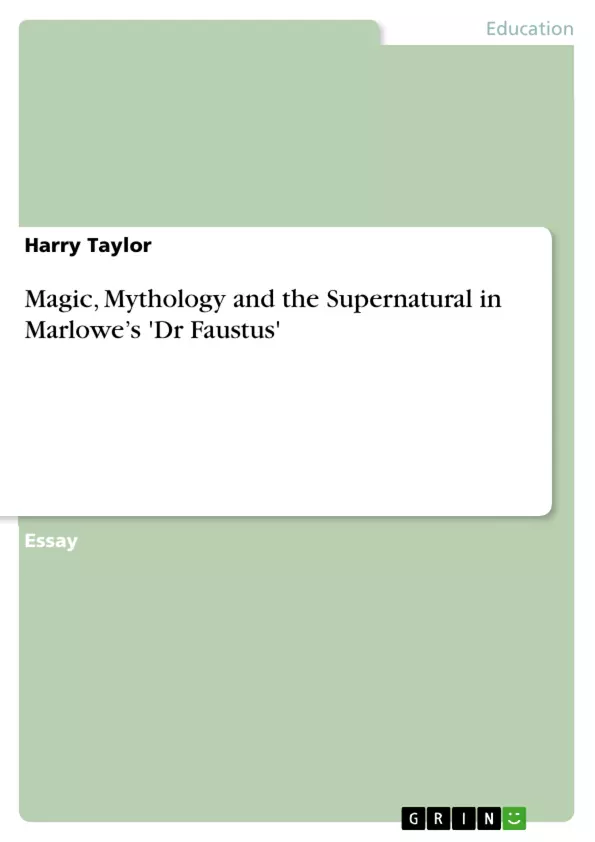A ~5,500 word critical examination into the role and employment of myth, magic and the supernatural within Marlowe's play 'Dr Faustus'. Includes academic referencing and bibliography of all works cited.
Table of Contents
- Introduction
- The Role of Magic
- Faustus' Desire for Power and Deification
- Faustus' Pursuit of Immortality
- Faustus' Desire for Knowledge
- The Role of Mythology
- The Role of the Supernatural
- The Impact of the Supernatural on Faustus' Psychology
- The Relationship Between Magic, Mythology and the Supernatural
- Conclusion
Objectives and Key Themes
This essay examines the ways in which the invocation of the "spirits of the past" and the difficulty of "revolutionising" one's existence are manifested in Marlowe's *Dr Faustus*. The essay focuses on the presence of the mythological and the supernatural elements within the play, and the way in which these are facilitated by the employment of magic.- The role of magic in facilitating Faustus' aspirations of deification
- The relationship between magic, mythology, and the supernatural
- The impact of the supernatural on Faustus' psychology
- The nature of Faustus' desire for power and knowledge
- The interplay of the past, present, and future in Faustus' quest for self-transformation
Chapter Summaries
The essay begins by establishing the key terms of the inquiry: magic, mythology, and the supernatural. It argues that these elements are intertwined and contribute to the play's exploration of themes of power, knowledge, and self-transformation. The essay then moves on to examine the role of magic in the play. It explores Faustus' desires for power, knowledge, and immortality, and how magic is used to fulfill these desires. The essay argues that Faustus' pursuit of these goals is driven by a desire for deification, a desire to transcend the limitations of human existence. The essay further investigates the role of mythology in the play, arguing that it serves as a means for Faustus to connect with ancient history and "revolutionise" himself as an individual. Faustus seeks to reconstruct the domain of the old gods around himself, deifying himself as the figure of power in a present that he has manufactured from the past. The essay concludes by examining the relationship between magic, mythology, and the supernatural in *Dr Faustus*. It argues that these elements are interconnected and contribute to the play's exploration of themes of ambition, hubris, and the consequences of seeking power beyond human limits.Keywords
The essay focuses on the intersection of magic, mythology, and the supernatural in Marlowe's *Dr Faustus*, exploring themes of power, knowledge, self-transformation, deification, and the relationship between the past, present, and future.Frequently Asked Questions
What is the focus of this critical examination of 'Dr Faustus'?
The essay examines the roles and employment of magic, mythology, and the supernatural within Christopher Marlowe's play 'Dr Faustus'.
How does magic function in the play according to the essay?
Magic serves as a tool for Faustus to pursue power, knowledge, and deification, helping him attempt to transcend human limitations.
What is the role of mythology in Faustus' quest?
Mythology allows Faustus to connect with ancient history and attempt to "revolutionise" himself by reconstructing the domain of old gods around his own persona.
How does the supernatural affect Faustus' psychology?
The essay explores the psychological impact of supernatural elements on Faustus, particularly regarding his ambition, hubris, and the fear of his eventual fate.
What are the key themes explored in the text?
Key themes include the desire for deification, the interplay between past and present, and the consequences of seeking power beyond human limits.
Does the essay include academic references?
Yes, the work includes full academic referencing and a bibliography of all cited works.
- Citation du texte
- Harry Taylor (Auteur), 2012, Magic, Mythology and the Supernatural in Marlowe’s 'Dr Faustus', Munich, GRIN Verlag, https://www.grin.com/document/207917



